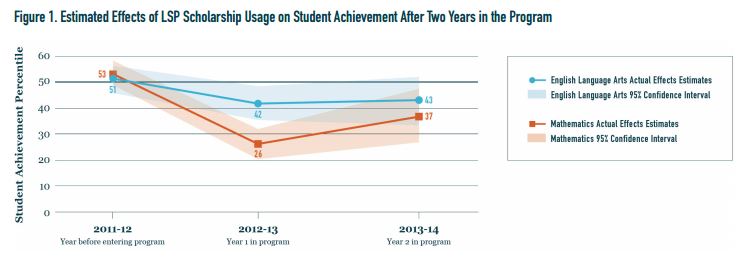A two-year study of school vouchers in Louisiana found the program has a “significant and substantial negative” impact on student achievement, but researchers believe the program may be showing signs of improvement.
The two-year study found students receiving vouchers to attend private schools lost ground to their public school peers in math and social studies, but not in English and science, during the 2013-14 school year. Students’ math scores, though still lower than their public school peers’, saw significant improvement between the first and second year of the study.
 The results were released this evening in a compendium of four studies that form the deepest dive yet into the impact of Louisiana’s school voucher program.
The results were released this evening in a compendium of four studies that form the deepest dive yet into the impact of Louisiana’s school voucher program.
“In general our results present a mixed picture of the LSP’s effectiveness,” the authors of the studies, led by the Education Research Alliance at Tulane University, wrote in an overview of their findings.
The remaining three studies found the private school choice program helps reduce racial segregation, stimulates improvements at surrounding public schools, and appears to have little effect on conscientiousness and other non-academic measures of student well-being.
The authors of the report on student achievement, Jonathan Mills of Tulane and Patrick Wolf of the School Choice Demonstration Project at the University of Arkansas, wrote that the negative effects they found are “unprecedented in the literature of random assignment evaluation of school voucher programs.”
Past studies from around the country have generally found positive or neutral results.
The Louisiana Scholarship Program (LSP), offers low-income students attending public schools graded C, D or F a scholarship to attend a private school of their choice. Admissions are centrally controlled by a single application that sorts students into schools based on their stated references.
Vouchers are worth up to the amount private schools charge for tuition or the amount of funding public schools would receive for that student, whichever is less. The average tuition voucher was worth $5,245, more than $3,000 less than what was available for the same child to attend a public school. Private schools are prohibited from charging more than the voucher amount.
Schools participating in the program must administer statewide standardized tests to voucher students. Poor-performing private schools can be denied future scholarships or kicked off the program all together.
Last month, three economists released a study on the Louisiana voucher program finding it significantly harmed student achievement in all four subject areas after the 2012-13 school year, the first in which it was expanded statewide. That study unleashed a firestorm of debate between school choice supporters about whether policy design caused the negative results.
The new report finds the negative impact diminished in the second year, though vouchers still harmed students’ progress in two subjects — math and social studies.
The most significant improvement occurred in math, though results remained negative. By the second year, the deficit between voucher students and public schools on the math test had been cut roughly in half.
Among the students accepting vouchers, the top third of public-school students accepting vouchers saw the largest decline in math achievement. The bottom third of students actually saw small, but statistically insignificant, achievement gains in English and math at their new private schools.
Researchers offered four potential reasons for the unprecedented negative results. First, the researchers note that this is the first state-wide voucher study. “The scale of implementation may have played a role in the significant negative effect estimates presented here,” they wrote.
Next, they found some evidence that private schools may have been at a disadvantage by being subject to the state’s assessment, which may not have been fully aligned to their curriculum. The researchers noted the improvement in math performance in year two may be evidence of private schools adjusting to the new state curriculum.
Researchers also speculated the results may have been due to a “doubly-disadvantaged” student population — economically disadvantaged students who had also been assigned to low-performing public schools. With the voucher being worth a fraction of the public-school support, private schools were in a sense being asked to do more with less. Private schools may have been under-prepared, as well underfunded, to enroll students with such significant disadvantages.
Finally, researchers observed that regulations on the program may be discouraging higher quality private schools from participating.
Each of these four have may have helped produce the negative results.
A separate study released today found that students remaining behind in public schools saw slight improvements in their math scores, though the impact on public-school students in English was minimal. Students in public schools ranked “D” or “F” saw the largest improvement. Tha report, by Anna Egalite of North Carolina State University, joins 21 other studies finding small but positive benefits for public school students due to competition from school choice.
The Education Research Alliance and School Choice Demonstration Project also said they plan to produce three- and four-year studies, and to explore the potential policies that may be contributing to the negative results. That means they have a few more years to study and learn from Louisiana’s voucher program.


